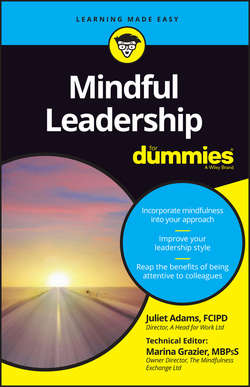Читать книгу Mindful Leadership For Dummies - Adams Juliet - Страница 9
На сайте Литреса книга снята с продажи.
Part 1
Breaking the Mould
Chapter 2
Discovering Why Mindfulness Matters to Leaders
Mindfully Reducing Leadership Stress
ОглавлениеLeadership can be a lonely, isolating job. It can also be exhilarating and rewarding. Although you can’t always predict or control the cards that life deals you, you can learn to control your response to them. A core component of mindfulness is learning to observe your own unique patterns of thought and behaviour. This allows you to take control and become a wiser, more considered leader.
Minding the gap
Awareness of your patterns of thoughts and behaviour are essential to being a good leader. Thoughts can trigger emotions and tension in the body, which lead to stress. Until recently, these were largely overlooked by leadership and executive education programmes. Over the past few years, leading business schools have added mindfulness training to leadership and MBA programmes.
Basic instruction in mindfulness helps you to develop awareness of the impact of your thoughts on your actions as a leader. In addition, it can improve focus, decision-making and relationships with peers and subordinates.
As you learn to reduce the flow of incoming information into the brain (more about this in Chapter 8), you may start to notice that a considerable gap exists between how you think things are, or how you wish they were, and how they actually are (see Figure 2-1). In order to be a mindful leader, it’s useful to consciously ‘mind the gap’. The thoughts we think are not necessarily facts, but our brain often responds as if they are.
© John Wiley & Sons, Inc.
FIGURE 2-1: Mind the gap.
Mindful leaders learn to observe thoughts as simply mental processes that come and go without knee-jerk reactions.
To help you start to ‘mind the gap’, try the following:
❯❯ See whether you can start to consciously ‘mind the gap’ in your daily life. Remember: you control your thoughts – your thoughts shouldn’t control you!
❯❯ Practice treating thoughts simply as mental processes that come and go rather than facts.
❯❯ See whether you can notice how thoughts can evoke strong emotions or sensations in the body.
❯❯ When you notice your thoughts spiralling down and depressive or negative thinking creeping in, take three minutes to do the three-step breathing space (see Chapter 10) to help you retain your equilibrium and consider things from a more objective viewpoint.
Gaining a sense of completion
Gaining a sense of completion can be a good way to diffuse stress.
At work, one task or project can easily merge into another, giving you the feeling that you’re on a never-ending treadmill and are achieving nothing. The truth of the matter is that you’ve probably achieved a lot during the day; you have just failed to register a sense of completion.
To gain a better sense of completion, try the following:
❯❯ Break down complex or lengthy tasks into subtasks. Consciously acknowledge completion of each subtask, activating your brain’s feel-good reward circuitry.
❯❯ Pair up small tasks with larger projects or tasks. As you complete these small tasks, acknowledge how they’ve contributed to the advancement and achievement of your larger project or task.
❯❯ Celebrate each and every small win.
❯❯ At the end of each workday before you go home, pause to reflect on and consciously acknowledge all the things you’ve accomplished in the day.
Engaging your recovery and renewal circuitry
Power stress, like any stress encountered over extended periods of time, makes the body susceptible to serious illness, digestive complaints and disturbed sleep patterns. It can drain your energy and capability to function and innovate.
Recovery and renewal can come from several sources. Small acts of kindness to yourself, others or even random strangers can have a hugely beneficial impact on your brain chemistry. Brain scans have revealed that even imagining an act of kindness, using virtual reality technology, can have the same positive impact on the brain as doing it for real.
Prioritise time to do things that you love doing that you may have stopped doing because you became ‘too busy’. Go dancing, do stand-up comedy, go to the theatre, or just enjoy quality time with friends, family or pets. This time will help you to reduce stress and renew yourself, making you fitter to lead.
Make mindfulness part of your daily mental hygiene routine. It will help you to recover from the stresses and strains of the day and renew yourself by helping your brain chemistry to return to a rest and maintenance state.
